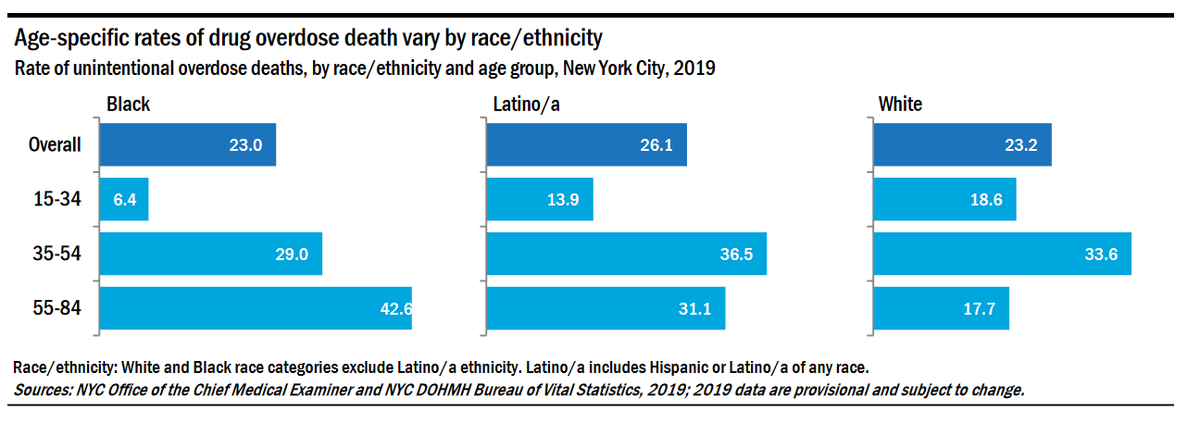
The NYC Dept of Health and Mental Hygiene (@nycHealthy) released some 2019 overdose death data and preliminary 2020 overdose death numbers for the first quarter of the year. It's not good news. A thread 🧵🧵🧵
1) Overdose deaths remained high in 2019; similar to 2018 rate of 21.2 per 100,000. Opioids involved in 83% over all overdose deaths, fentanyl most commonly involved drug in overdoses (in 68% of deaths). You can read more here:
www1.nyc.gov/assets/doh/dow…
www1.nyc.gov/assets/doh/dow…
2) You can see here that the overdose death rates in NYC increased in recent years. Not a coincidence that we saw this jump after fentanyl entered our heroin supply. 

3) In 2018 and in 2019, Latinx NYCers had the highest overdose death rate in the city, particularly for middle-aged. Highest OD rates among Black older adults. In 2019, overdose death rates went up for both Black and Latinx NYCers while they decreased slightly for white NYCers. 

4) Bronx had the highest overdose death rate in 2019, with biggest increases in South Bronx. Five neighborhoods across the city have had the highest rates of overdose in recent years. 

5) This graph illustrates drug overdose death rates by drugs. Notice the light green line- that's cocaine. Cocaine was involved in 49% of opioid overdose deaths in NYC in 2019. Benzos not on graph, but involved in 30% of opioid overdose deaths. It's a polydrug overdose crisis. 

6) Racial disparities in cocaine-involved overdose deaths, so rates highest among Black and Latinx NYCers. "Cocaine-involved overdoses among Black New Yorkers were less likely to involve an opioid (67%) compared with Latino/a (86%) and White (85%) New Yorkers"
7) Provisional 2020 NYC overdose death data available now, showing gradual increases every quarter in 2019 with jump up to 1st quarter of 2020. Largely driven by opioids and fentanyl. We will get more final coutns in coming months.
www1.nyc.gov/assets/doh/dow…
www1.nyc.gov/assets/doh/dow…

8) This data shows a troubling increasing trend that pre-dated COVID-19 and was likely exacerbated by COVID for the rest of the year. We have been in this overdose crisis for over a decade and it shows no signs of slowing down; only intensifying. It didn't have to be this way.
• • •
Missing some Tweet in this thread? You can try to
force a refresh




